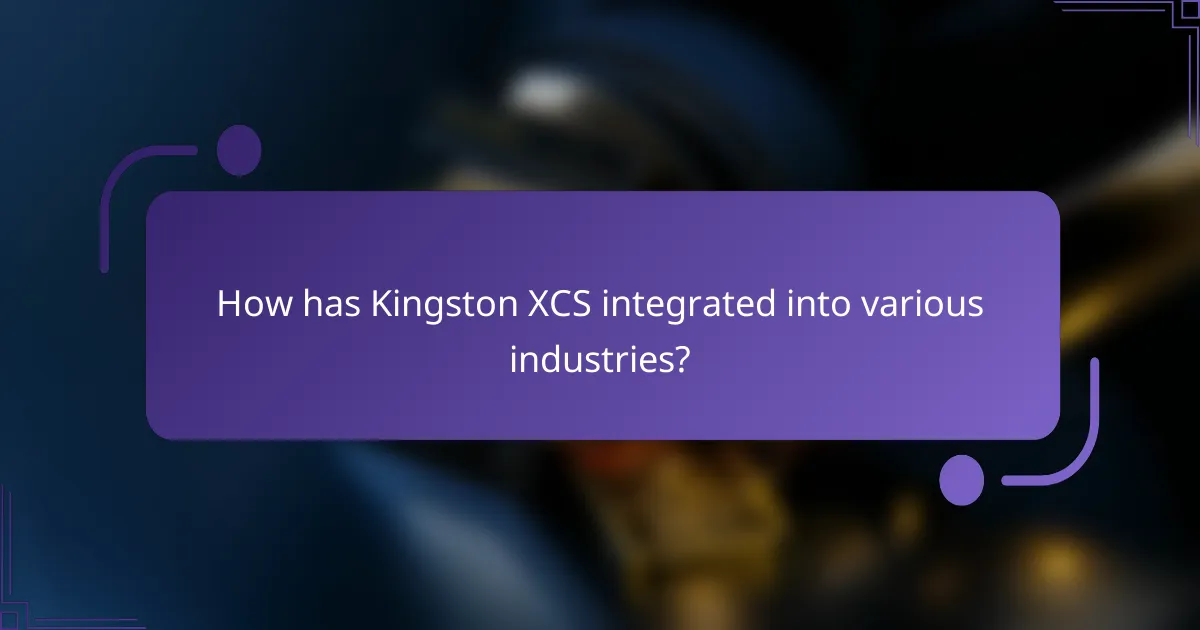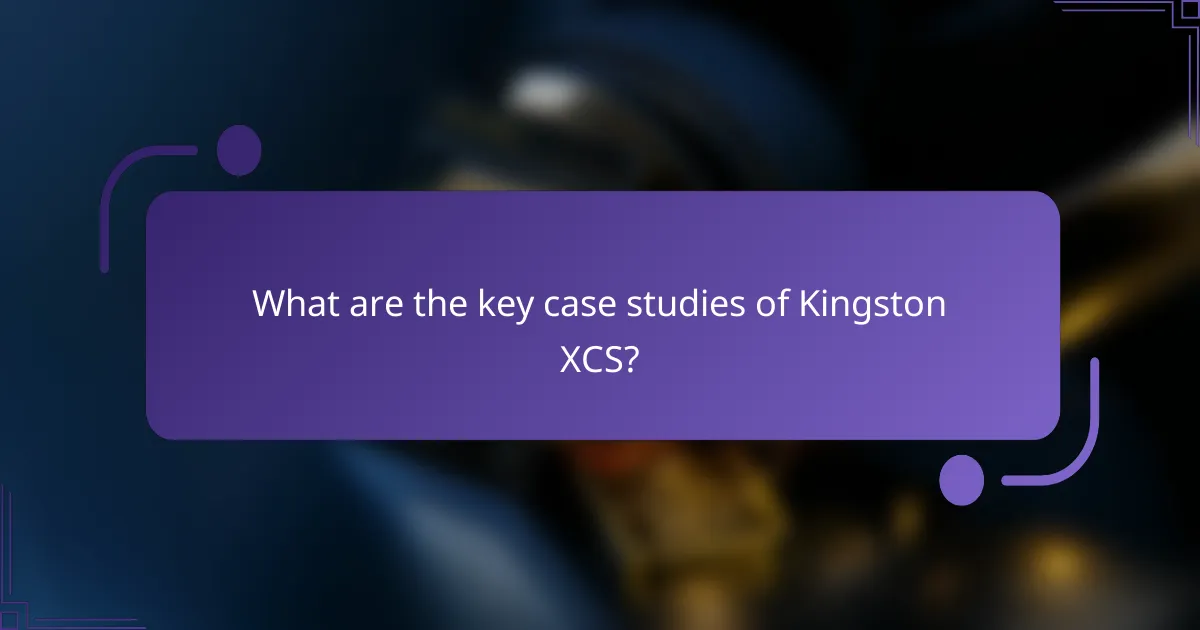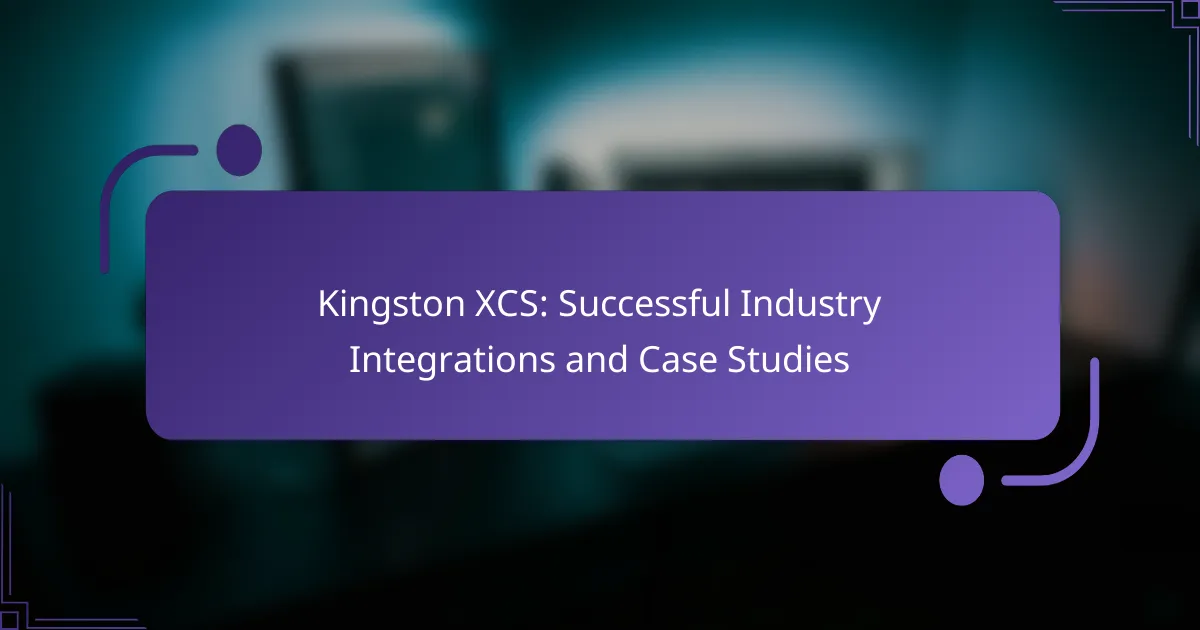Kingston XCS has effectively integrated into diverse industries by delivering reliable storage solutions that improve data management and accessibility. Through key case studies in sectors such as healthcare, education, and finance, it demonstrates its versatility and impact on operational efficiency and cost savings, enabling organizations to optimize processes and enhance productivity.

How has Kingston XCS integrated into various industries?
Kingston XCS has successfully integrated into multiple industries by providing reliable storage solutions that enhance data management and accessibility. Its adaptability allows organizations to streamline operations and improve efficiency across various sectors.
Integration in healthcare
In the healthcare sector, Kingston XCS supports the storage and management of vast amounts of patient data, ensuring compliance with regulations like HIPAA. Hospitals and clinics utilize Kingston’s solutions for electronic health records (EHR) systems, enabling quick access to critical patient information.
For example, Kingston XCS products can facilitate real-time data sharing among medical professionals, improving patient care and operational efficiency. Organizations should consider the security features of Kingston XCS to protect sensitive health information.
Integration in education
Kingston XCS has made significant inroads in the education sector by providing storage solutions that support digital learning environments. Schools and universities use Kingston products to manage learning management systems (LMS) and store educational resources.
These solutions help institutions enhance collaboration among students and faculty. When implementing Kingston XCS in education, it’s essential to evaluate the scalability of storage to accommodate growing data needs.
Integration in finance
In finance, Kingston XCS plays a crucial role in secure data storage and transaction processing. Financial institutions rely on Kingston solutions to manage sensitive customer data and ensure compliance with regulations such as GDPR.
Using Kingston XCS can help banks and investment firms improve data retrieval speeds, which is vital for real-time trading and reporting. Organizations should prioritize data encryption features to safeguard financial information.
Integration in manufacturing
Manufacturing companies benefit from Kingston XCS by leveraging its storage solutions for managing supply chain data and production processes. These solutions enable manufacturers to track inventory levels and production schedules efficiently.
For instance, integrating Kingston XCS can streamline operations by providing quick access to data analytics, helping manufacturers optimize their workflows. It’s advisable to assess the compatibility of Kingston products with existing systems to ensure seamless integration.
Integration in retail
In the retail industry, Kingston XCS enhances customer experience through efficient data management. Retailers use Kingston solutions to handle point-of-sale (POS) systems and customer databases, improving transaction speeds and inventory management.
For example, Kingston XCS can support real-time inventory tracking, allowing retailers to respond quickly to customer demands. Retailers should consider the durability of Kingston products, especially in high-traffic environments, to minimize downtime.

What are the key case studies of Kingston XCS?
Kingston XCS has been successfully integrated into various industries, showcasing its versatility and effectiveness. Key case studies highlight its impact in healthcare, education, and finance, demonstrating how it enhances operations and improves outcomes.
Case study: Kingston XCS in healthcare
In the healthcare sector, Kingston XCS has streamlined data management and improved patient care. By integrating with electronic health records (EHR) systems, it enables healthcare providers to access patient information quickly, reducing wait times and enhancing treatment efficiency.
One notable implementation involved a large hospital network that reported a 30% decrease in patient data retrieval times. This improvement not only increased staff productivity but also led to higher patient satisfaction scores.
Case study: Kingston XCS in education
In educational institutions, Kingston XCS has transformed how data is handled, facilitating better communication and resource management. Schools have utilized the platform to integrate administrative and academic data, allowing for real-time updates and improved decision-making.
A university that adopted Kingston XCS noted a significant reduction in administrative workload, freeing up staff to focus on student engagement. The system’s ability to support remote learning environments has also been crucial, especially during recent global disruptions.
Case study: Kingston XCS in finance
In the finance industry, Kingston XCS has enhanced data security and compliance with regulatory standards. Financial institutions have leveraged the platform to manage sensitive information while ensuring adherence to regulations such as GDPR and PCI DSS.
For example, a regional bank implemented Kingston XCS to automate compliance reporting, resulting in a 40% reduction in manual processing errors. This shift not only improved accuracy but also bolstered customer trust through enhanced data protection measures.

What benefits does Kingston XCS provide to businesses?
Kingston XCS offers businesses enhanced data management, improved operational efficiency, and significant cost savings through seamless integration with existing systems. These benefits help organizations streamline processes and optimize resource allocation, ultimately driving productivity and profitability.
Enhanced data management
Kingston XCS enhances data management by providing a centralized platform for data storage and retrieval. This allows businesses to easily access and analyze their data, leading to better decision-making and improved insights.
With features such as automated data backup and real-time data synchronization, organizations can ensure data integrity and availability. This is particularly valuable for businesses that rely on timely information for operations and strategy.
Improved operational efficiency
Operational efficiency is significantly boosted with Kingston XCS as it automates routine tasks and reduces manual intervention. By streamlining workflows, businesses can minimize errors and accelerate processes, leading to faster turnaround times.
For instance, integrating Kingston XCS with existing enterprise resource planning (ERP) systems can enhance coordination across departments, enabling smoother operations and better resource management. This integration often results in a more agile business environment.
Cost savings through integration
Integrating Kingston XCS can lead to substantial cost savings for businesses by reducing the need for multiple disparate systems. By consolidating data management into a single platform, companies can lower maintenance costs and decrease the complexity of their IT infrastructure.
Additionally, organizations may experience reduced training costs as employees become proficient in using one integrated system rather than navigating several different tools. This efficiency can translate into lower operational expenses and improved bottom lines.

What challenges can arise with Kingston XCS implementations?
Kingston XCS implementations can face several challenges, including integration complexity, data migration issues, and user training requirements. Addressing these challenges early can help ensure a smoother deployment and better overall performance.
Integration complexity
Integration complexity often arises from the need to connect Kingston XCS with existing systems and software. Organizations must assess their current infrastructure and determine compatibility with Kingston’s solutions, which can vary widely based on the technology stack in use.
To mitigate integration challenges, consider creating a detailed integration plan that outlines all necessary connections and data flows. Engaging with IT specialists familiar with both Kingston XCS and your existing systems can streamline this process and reduce potential roadblocks.
Data migration issues
Data migration issues can occur when transferring existing data to the Kingston XCS platform. Common problems include data loss, corruption, or incompatibility, which can disrupt business operations if not managed carefully.
To ensure a successful migration, conduct thorough data audits and cleansing before the transfer. Implementing a phased migration approach can also help identify and resolve issues early, minimizing impact on daily activities.
User training requirements
User training is crucial for maximizing the benefits of Kingston XCS. Employees need to understand how to effectively use the system to avoid errors and inefficiencies that can arise from improper usage.
Develop a comprehensive training program that includes hands-on sessions, user manuals, and ongoing support. Regularly updating training materials as the system evolves will help maintain user proficiency and confidence in utilizing the platform.

How to choose the right Kingston XCS solution for your industry?
Choosing the right Kingston XCS solution involves assessing your specific industry needs, performance requirements, and budget constraints. Consider factors such as data volume, access speed, and integration capabilities to ensure optimal functionality.
Understanding your industry requirements
Each industry has unique demands that influence the choice of Kingston XCS solutions. For example, healthcare requires high data security and compliance with regulations like HIPAA, while financial services prioritize speed and reliability for transactions. Identify the critical factors that impact your operations to guide your selection.
Evaluating performance metrics
Performance metrics such as read/write speeds, latency, and throughput are essential when selecting a Kingston XCS solution. Aim for solutions that offer low latency, typically in the low tens of milliseconds, and high throughput to handle peak loads efficiently. Benchmark against your current systems to determine the improvements needed.
Budget considerations
Your budget will significantly influence your choice of Kingston XCS solutions. Solutions can vary widely in cost, so it’s crucial to balance performance needs with financial constraints. Consider not only the initial investment but also long-term operational costs, including maintenance and potential upgrades.
Integration capabilities
Ensure that the Kingston XCS solution you choose can seamlessly integrate with your existing systems and workflows. Look for compatibility with your current hardware and software to minimize disruption. A solution that supports standard protocols and APIs can facilitate smoother integration.
Case studies and success stories
Reviewing case studies from similar industries can provide valuable insights into how Kingston XCS solutions have been successfully implemented. These examples can highlight best practices, potential pitfalls, and the tangible benefits realized by other organizations, helping you make a more informed decision.
